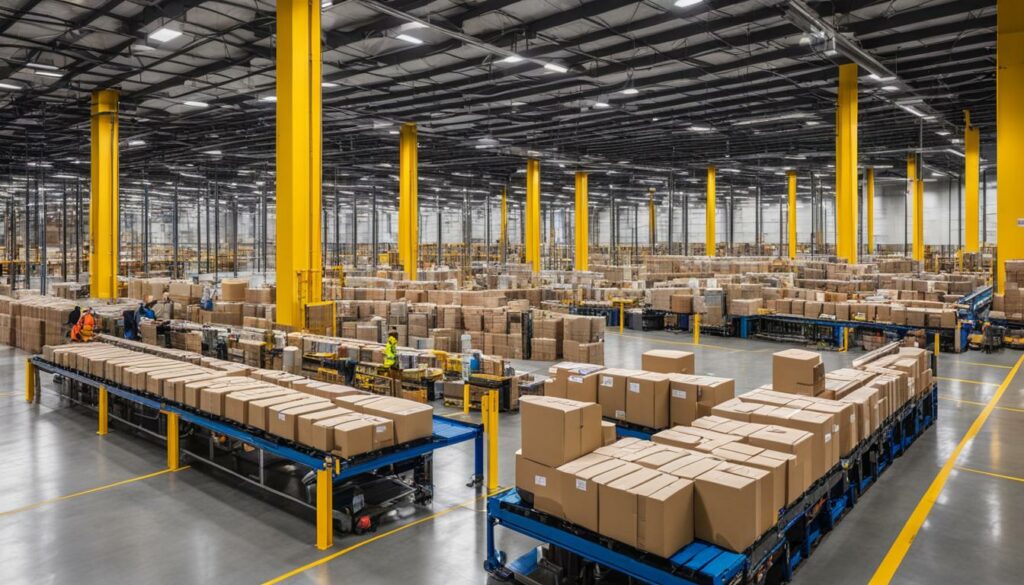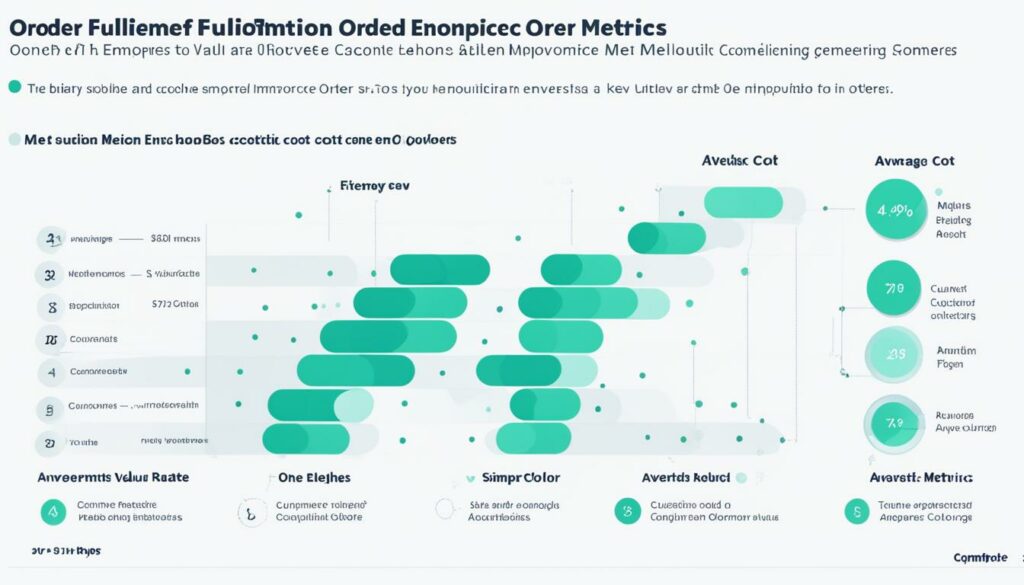In the fast-paced world of ecommerce, efficient order fulfillment is crucial for ensuring customer satisfaction and driving business success. But what exactly is order fulfillment in ecommerce?
Order fulfillment in ecommerce encompasses the complete process of receiving, processing, packaging, and delivering online orders to customers. It involves various stages such as order management, inventory management, warehousing, packaging, shipping, and even reverse logistics. Each step plays a critical role in ensuring that customers receive their orders accurately and in a timely manner.
Ecommerce fulfillment is not just about delivering products; it is about creating a seamless and positive customer experience from start to finish. By effectively managing the ecommerce supply chain, businesses can meet customer expectations, maintain inventory accuracy, streamline order processing, save costs, and build a positive brand image.
As an ecommerce business, understanding the intricacies of order fulfillment is essential for achieving success in the competitive online marketplace. Let’s delve deeper into the importance of order fulfillment and explore strategies to optimize this crucial process.
Key Takeaways:
- Order fulfillment in ecommerce refers to the complete process of receiving, processing, packaging, and delivering online orders to customers.
- Efficient order fulfillment is crucial for customer satisfaction, improved order accuracy, efficient order processing, inventory management, cost savings, scalability, and building a positive brand image.
- Strategies for improving order fulfillment include efficient inventory management, technology integration, warehouse optimization, logistics management, personalization, returns management, and implementing scalable systems.
- Customer behavior greatly influences order fulfillment in ecommerce, and catering to their preferences and needs is essential for success.
- Order fulfillment is closely related to other ecommerce metrics such as customer satisfaction, order accuracy, order processing time, inventory turnover, return rate, and cost per order.
The Importance of Order Fulfillment in Ecommerce
Order fulfillment is a critical aspect of running a successful ecommerce business. It encompasses the entire process of receiving, processing, packaging, and delivering online orders to customers. Effective order fulfillment not only ensures customer satisfaction but also brings a host of other benefits.
Customer satisfaction is at the core of successful ecommerce fulfillment. When customers receive their orders in a timely manner, accurately packaged and delivered, it enhances their experience and builds trust in the brand. Satisfied customers are more likely to become repeat purchasers and recommend the brand to others.
Efficient order processing is another key advantage of streamlined fulfillment operations. By implementing efficient order management systems and processes, businesses can minimize errors and delays in order fulfillment. This leads to improved order accuracy and faster delivery, which further contributes to customer satisfaction and loyalty.
In addition to customer satisfaction, proper inventory management is crucial for effective order fulfillment. By keeping track of inventory levels in real-time and managing stock efficiently, businesses can ensure that popular products are always available and minimize the risk of stockouts. This helps in fulfilling orders promptly and avoiding disappointed customers.
Cost savings is another significant benefit that arises from efficient order fulfillment. By optimizing order processing, inventory management, and warehouse operations, businesses can reduce expenses associated with labor, storage, and returns, among others. This ultimately leads to improved profitability and helps businesses stay competitive in the market.
Scalability is another advantage of having robust order fulfillment processes in place. As an ecommerce business grows and order volumes increase, efficient fulfillment operations enable businesses to handle larger order volumes without sacrificing efficiency or quality. This scalability allows businesses to meet the demands of a growing customer base and seize new opportunities without risking customer satisfaction.
Furthermore, positive brand image and reputation are closely tied to order fulfillment. When a brand consistently delivers orders accurately and on time, it creates a positive perception among customers. This not only enhances the brand’s reputation but also reinforces customer trust and loyalty.
By outsourcing fulfillment operations to specialized service providers, businesses can focus on their core competencies and strategic initiatives. This allows them to allocate resources effectively and concentrate on areas such as product development, marketing, and customer acquisition.

Key Benefits of Order Fulfillment in Ecommerce:
- Customer satisfaction and loyalty
- Improved order accuracy
- Efficient order processing
- Cost savings
- Scalability
- Positive brand image and reputation
- Focus on core competencies
In summary, order fulfillment plays a pivotal role in the success of an ecommerce business. It impacts customer satisfaction, order accuracy, order processing efficiency, inventory management, cost savings, scalability, brand image, and focus on core competencies. By prioritizing efficient order fulfillment, businesses can create a positive customer experience, gain a competitive edge, and drive long-term growth.
Strategies to Improve Order Fulfillment in Ecommerce
Improving order fulfillment in ecommerce is crucial for enhancing customer satisfaction, optimizing operations, and driving business growth. By implementing the right strategies, businesses can streamline their order fulfillment processes and deliver a seamless experience to their customers. Here are some key strategies to consider:
- Efficient Inventory Management: Utilize real-time tracking and forecasting to maintain optimal inventory levels. This ensures that products are available when customers place an order, minimizing stockouts and maximizing customer satisfaction.
- Technology Integration: Integrate ecommerce platforms and warehouse management systems to automate order processing, inventory tracking, and communication. This reduces manual errors, improves efficiency, and enables real-time visibility into the fulfillment process.
- Warehouse Optimization: Optimize the layout and design of your warehouse to enhance efficiency and minimize picking and packing times. Analyze order patterns and arrange products strategically for easy access and faster fulfillment.
- Logistics Management: Implement real-time tracking and delivery management systems to monitor shipments and ensure timely and accurate deliveries. This enhances transparency, enables proactive communication with customers, and improves overall customer satisfaction.
- Personalization: Understand customer behavior and preferences through data analysis. Leverage this information to personalize the order fulfillment process, such as recommending relevant products or offering customized packaging options. Personalization creates a more engaging and tailored experience for customers, fostering loyalty and increasing brand value.
- Returns Management: Establish clear policies and efficient processes for handling returns. Streamline the returns process to minimize time and effort for both customers and your team. Effective returns management builds trust, reduces costs, and boosts customer satisfaction.
- Implementing Scalable Systems: As your business grows, it’s essential to have scalable order fulfillment systems in place. Invest in technologies and processes that can handle increased order volumes without compromising efficiency. Scalable systems ensure smooth operations and customer satisfaction, even during peak periods.
By adopting these order fulfillment strategies, ecommerce businesses can improve their overall operational efficiency, enhance customer satisfaction, and gain a competitive edge in the market.

Customer Behavior and Order Fulfillment in Ecommerce
Customer behavior plays a crucial role in the order fulfillment process in ecommerce. In today’s fast-paced digital landscape, customers have high expectations when it comes to delivery speed, order accuracy, tracking and updates, and the returns process. As an ecommerce business, meeting these expectations is essential for customer satisfaction, repeat purchases, and building a positive brand reputation.
Delivery speed is a prime concern for customers. They want their orders to arrive quickly and efficiently. Slow delivery times can lead to customer dissatisfaction and may even result in order cancellations. It’s essential for ecommerce businesses to streamline their order fulfillment process to ensure prompt delivery.
Order accuracy is another critical factor in customer satisfaction. Customers expect to receive the exact products they ordered, in the right quantities and specifications. Efficient order fulfillment systems and processes can minimize errors and improve order accuracy, enhancing the overall customer experience.
Tracking and updates keep customers informed about the progress and status of their orders. Customers appreciate real-time tracking information, as it gives them transparency and control over the delivery process. Ecommerce businesses should invest in systems that provide accurate tracking updates to meet these customer expectations.
The returns process is an integral part of ecommerce order fulfillment. Customers expect a streamlined and hassle-free return experience should they need to send back a product. Implementing a clear and efficient returns policy can foster trust and confidence with customers, ultimately leading to increased customer satisfaction.
Understanding and catering to customer preferences and needs is vital for successful order fulfillment and customer satisfaction. By aligning their processes and systems with customer expectations for delivery speed, order accuracy, tracking and updates, and returns, ecommerce businesses can create a positive customer experience, encouraging repeat purchases and fostering brand loyalty.
The Relationship Between Order Fulfillment and Other Ecommerce Metrics
When it comes to ecommerce success, order fulfillment is not an isolated process; it is closely entwined with other important metrics. Factors such as customer satisfaction, order accuracy, order processing time, inventory turnover, return rate, and cost per order are all significantly influenced by the efficiency and accuracy of the order fulfillment process.
Customer satisfaction is a crucial metric that measures how well a business meets its customers’ expectations and needs. Timely and accurate order fulfillment plays a paramount role in ensuring customer satisfaction. When orders are fulfilled promptly and accurately, customers experience a positive shopping experience, leading to higher levels of satisfaction.
Order accuracy refers to the degree of correctness in fulfilling customer orders. An efficient order fulfillment process minimizes errors and ensures that customers receive the correct products. Improved order accuracy not only enhances customer satisfaction but also reduces the cost associated with returns and replacements.
Order processing time is the duration it takes for an order to be processed, from the moment it is placed to the moment it is ready for shipment. A streamlined and efficient order fulfillment process reduces processing time, enabling faster order fulfillment and enhancing the overall customer experience.
Inventory turnover measures how quickly a business sells its inventory within a specific period. Effective order fulfillment contributes to a higher inventory turnover by ensuring that products are delivered to customers promptly. This leads to improved cash flow, lower holding costs, and reduces the risk of stock obsolescence.
Return rate reflects the percentage of items that customers return. A well-functioning order fulfillment process helps minimize the return rate by ensuring accurate and timely delivery, reducing the likelihood of customers returning products due to dissatisfaction or errors in their orders.
Cost per order measures the average cost incurred during the order fulfillment process, including inventory storage, order processing, packing, and shipping. Optimizing the order fulfillment process reduces the cost per order, improving overall profitability.
By focusing on improving order fulfillment processes, businesses can positively impact these ecommerce metrics. Increased customer satisfaction, higher order accuracy, reduced order processing time, improved inventory turnover, lower return rates, and decreased cost per order all contribute to the overall success of an ecommerce business.

The Relationship Between Order Fulfillment and Ecommerce Metrics
| Ecommerce Metrics | Impact of Order Fulfillment |
|---|---|
| Customer Satisfaction | Efficient and accurate order fulfillment leads to higher levels of customer satisfaction. |
| Order Accuracy | Improving order fulfillment minimizes errors and ensures customers receive the correct products. |
| Order Processing Time | A streamlined order fulfillment process reduces processing time and improves the overall customer experience. |
| Inventory Turnover | Efficient order fulfillment leads to faster product delivery, increasing inventory turnover and improving cash flow. |
| Return Rate | Accurate and timely order fulfillment reduces the return rate by minimizing errors and customer dissatisfaction. |
| Cost per Order | Optimizing the order fulfillment process reduces the cost per order, improving profitability. |
Challenges and Considerations in Order Fulfillment
Order fulfillment in ecommerce presents a range of challenges that businesses must navigate to ensure smooth operations and customer satisfaction. From inventory management to last-mile delivery, each aspect of the fulfillment process requires careful consideration and strategic planning to overcome potential obstacles and optimize efficiency. Let’s explore the key challenges and considerations in order fulfillment:
1. Inventory Management
Accurate inventory management is crucial in order fulfillment. Maintaining optimal inventory levels helps prevent stockouts or overstocking, ensuring timely order processing and minimizing the risk of customer dissatisfaction. Real-time tracking, forecasting, and effective inventory replenishment strategies are essential for efficient inventory management.
2. Order Processing Efficiency
Efficient order processing is vital for meeting customer expectations. Streamlining the order processing workflow, including order verification, picking, packing, and labeling, helps expedite order fulfillment and reduce errors. Automation and technology integration, such as barcode scanning and order management systems, can significantly enhance order processing efficiency.
3. Warehouse Operations
Optimizing warehouse operations is key to seamless order fulfillment. This includes designing an efficient warehouse layout, organizing products for easy retrieval, and implementing effective inventory tracking systems. By maximizing storage capacity, minimizing travel distances, and optimizing picking routes, businesses can expedite order fulfillment and reduce operational costs.
4. Packaging and Shipping
Creating the right balance between product protection and cost efficiency is crucial in packaging and shipping. Choosing the right packaging materials, optimizing packaging processes, and negotiating favorable shipping rates can help businesses strike the perfect balance. Ensuring accurate labeling and documentation for international shipments is also important for smooth customs clearance.
5. Last-Mile Delivery
Last-mile delivery is the final and often most challenging stage of order fulfillment. Overcoming logistical complexities, optimizing delivery routes, and ensuring prompt and reliable delivery contribute to customer satisfaction. Collaborating with reliable logistics partners and leveraging technology for real-time tracking and route optimization can enhance last-mile delivery efficiency.
6. Returns and Customer Service
Efficient returns management and exceptional customer service play a critical role in maintaining customer loyalty and satisfaction. Implementing clear and transparent returns policies, streamlining the returns process, and providing timely resolution of customer issues contribute to a positive post-purchase experience.
7. Scalability
As ecommerce businesses grow, scalability becomes a vital consideration in order fulfillment. Anticipating future demand, optimizing processes for higher order volumes, and investing in scalable systems and technologies ensure that order fulfillment capabilities can adapt and expand along with business growth.
8. International Fulfillment
Expanding into international markets presents unique challenges in order fulfillment. Navigating customs regulations and documentation requirements, addressing varied shipping options and costs, and managing cross-border logistics require careful planning and expertise. Collaborating with international fulfillment partners or leveraging technology solutions can help simplify international fulfillment processes.
By addressing these challenges and considering the various aspects of order fulfillment, ecommerce businesses can optimize their operations, enhance customer satisfaction, and position themselves for sustainable growth in a competitive market.
Considerations for Successful Ecommerce Order Fulfillment
Successful ecommerce order fulfillment requires several prerequisites that businesses must carefully consider. These include effective inventory management, robust technology infrastructure, a skilled workforce, and a strategic location for fulfillment centers.
- Inventory Management: Efficient inventory management is vital for successful order fulfillment. It involves ensuring the availability of products, real-time tracking, and accurate forecasting.
- Technology Infrastructure: A robust technology infrastructure plays a significant role in streamlining order processing, inventory tracking, and communication. It enables seamless integration of ecommerce platforms and warehouse management systems, allowing for efficient operations.
- Skilled Workforce: A skilled workforce is essential for accurate picking, packing, and shipping processes. Well-trained employees ensure the reliability and efficiency of order fulfillment, leading to customer satisfaction.
- Strategic Location: Choosing a strategic location for fulfillment centers can significantly impact shipping costs and delivery times. Proximity to target markets and transportation hubs allows for faster and more cost-effective order processing.
By focusing on these prerequisites, ecommerce businesses can establish a strong foundation for successful order fulfillment, ensuring customer satisfaction, streamlined operations, and a competitive edge in the market.
Key Considerations for Successful Ecommerce Order Fulfillment
| Prerequisite | Description |
|---|---|
| Inventory Management | Efficiently managing available stock, tracking inventory in real-time, and accurately forecasting demand. |
| Technology Infrastructure | Establishing a robust technology infrastructure for streamlined order processing, inventory tracking, and communication. |
| Skilled Workforce | Employing a skilled workforce trained in accurate picking, packing, and shipping processes. |
| Strategic Location | Choosing a location that minimizes shipping costs and reduces delivery times by being closer to target markets and transportation hubs. |
The Benefits of Efficient Order Fulfillment in Ecommerce
Efficient order fulfillment in ecommerce brings numerous benefits that contribute to the overall success of a business. One of the key advantages is customer satisfaction. When orders are fulfilled in a timely and accurate manner, it leads to satisfied customers who are more likely to make repeat purchases and recommend the brand to others. This not only boosts sales but also helps in building positive brand reputation, which is crucial for long-term success.
Cost savings is another significant benefit of efficient order fulfillment. By streamlining the order processing, inventory management, and shipping processes, businesses can reduce expenses associated with returns and customer support. Implementing efficient systems and processes also enables cost-effective handling of order volumes, allowing the business to scale up without incurring additional costs.
Furthermore, efficient order fulfillment provides a competitive advantage in the market. In the highly competitive ecommerce industry, businesses that consistently deliver orders accurately and promptly are more likely to stand out from their competitors. This can attract new customers, build customer loyalty, and increase market share. Having a reputation for efficient order fulfillment sets the business apart and gives it an edge over others.
In summary, the benefits of efficient order fulfillment in ecommerce are far-reaching. It encompasses customer satisfaction, increased sales, positive brand reputation, cost savings, and a competitive advantage in the market. By prioritizing efficient order fulfillment, businesses can create a strong foundation for success in the ever-evolving ecommerce industry.
FAQ
What is order fulfillment in ecommerce?
Order fulfillment in ecommerce refers to the complete process of receiving, processing, packaging, and delivering online orders to customers. It involves various stages such as order management, inventory management, warehousing, packaging, shipping, and reverse logistics.
Why is order fulfillment important in ecommerce?
Efficient order fulfillment is crucial for customer satisfaction, improved order accuracy, efficient order processing, inventory management, cost savings, scalability, positive brand image, and the ability to focus on core competencies.
What strategies can improve order fulfillment in ecommerce?
Businesses can improve order fulfillment by implementing efficient inventory management, technology integration, warehouse optimization, logistics management, personalization, returns management, and scalable systems.
How does customer behavior influence order fulfillment in ecommerce?
Customer behavior greatly influences the order fulfillment process in ecommerce. Understanding and catering to customer preferences and needs is essential for successful order fulfillment and customer satisfaction.
How does order fulfillment relate to other ecommerce metrics?
Order fulfillment is closely related to other ecommerce metrics such as customer satisfaction, order accuracy, order processing time, inventory turnover, return rate, and cost per order. Improving order fulfillment can positively impact these metrics and contribute to the overall success of an ecommerce business.
What are the challenges and considerations in order fulfillment?
Order fulfillment in ecommerce faces various challenges, including inventory management, order processing efficiency, warehouse operations, packaging and shipping, last-mile delivery, returns and customer service, scalability, and international fulfillment. Businesses must address these challenges and consider factors such as maintaining accurate inventory levels, streamlining order processing, optimizing warehouse operations, and navigating international logistics.
What are the prerequisites for successful ecommerce order fulfillment?
Successful ecommerce order fulfillment requires effective inventory management, robust technology infrastructure, a skilled workforce, and a strategic location for fulfillment centers.
What are the benefits of efficient order fulfillment in ecommerce?
Efficient order fulfillment brings numerous benefits, including customer satisfaction, increased sales, positive brand reputation, cost savings, and a competitive advantage in the market.
